Benjamin Nachman
EveNet: A Foundation Model for Particle Collision Data Analysis
Jan 23, 2026Abstract:While deep learning is transforming data analysis in high-energy physics, computational challenges limit its potential. We address these challenges in the context of collider physics by introducing EveNet, an event-level foundation model pretrained on 500 million simulated collision events using a hybrid objective of self-supervised learning and physics-informed supervision. By leveraging a shared particle-cloud representation, EveNet outperforms state-of-the-art baselines across diverse tasks, including searches for heavy resonances and exotic Higgs decays, and demonstrates exceptional data efficiency in low-statistics regimes. Crucially, we validate the transferability of the model to experimental data by rediscovering the $Υ$ meson in CMS Open Data and show its capacity for precision physics through the robust extraction of quantum correlation observables stable against systematic uncertainties. These results indicate that EveNet can successfully encode the fundamental physical structure of particle interactions, which offers a unified and resource-efficient framework to accelerate discovery at current and future colliders.
Discriminative versus Generative Approaches to Simulation-based Inference
Mar 11, 2025Abstract:Most of the fundamental, emergent, and phenomenological parameters of particle and nuclear physics are determined through parametric template fits. Simulations are used to populate histograms which are then matched to data. This approach is inherently lossy, since histograms are binned and low-dimensional. Deep learning has enabled unbinned and high-dimensional parameter estimation through neural likelihiood(-ratio) estimation. We compare two approaches for neural simulation-based inference (NSBI): one based on discriminative learning (classification) and one based on generative modeling. These two approaches are directly evaluated on the same datasets, with a similar level of hyperparameter optimization in both cases. In addition to a Gaussian dataset, we study NSBI using a Higgs boson dataset from the FAIR Universe Challenge. We find that both the direct likelihood and likelihood ratio estimation are able to effectively extract parameters with reasonable uncertainties. For the numerical examples and within the set of hyperparameters studied, we found that the likelihood ratio method is more accurate and/or precise. Both methods have a significant spread from the network training and would require ensembling or other mitigation strategies in practice.
Generative Unfolding with Distribution Mapping
Nov 04, 2024



Abstract:Machine learning enables unbinned, highly-differential cross section measurements. A recent idea uses generative models to morph a starting simulation into the unfolded data. We show how to extend two morphing techniques, Schr\"odinger Bridges and Direct Diffusion, in order to ensure that the models learn the correct conditional probabilities. This brings distribution mapping to a similar level of accuracy as the state-of-the-art conditional generative unfolding methods. Numerical results are presented with a standard benchmark dataset of single jet substructure as well as for a new dataset describing a 22-dimensional phase space of Z + 2-jets.
CaloChallenge 2022: A Community Challenge for Fast Calorimeter Simulation
Oct 28, 2024
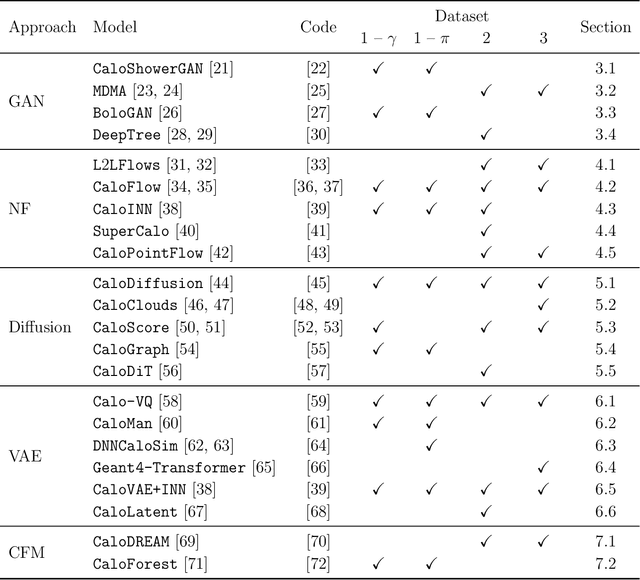
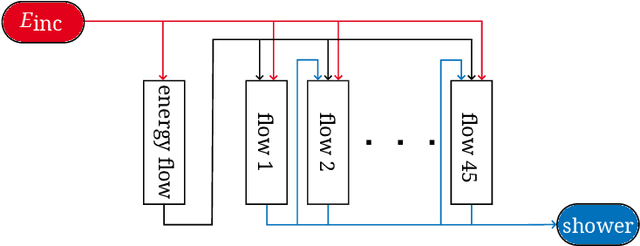
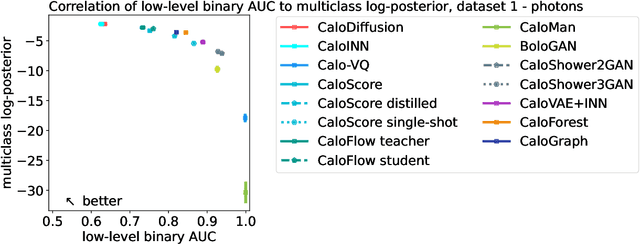
Abstract:We present the results of the "Fast Calorimeter Simulation Challenge 2022" - the CaloChallenge. We study state-of-the-art generative models on four calorimeter shower datasets of increasing dimensionality, ranging from a few hundred voxels to a few tens of thousand voxels. The 31 individual submissions span a wide range of current popular generative architectures, including Variational AutoEncoders (VAEs), Generative Adversarial Networks (GANs), Normalizing Flows, Diffusion models, and models based on Conditional Flow Matching. We compare all submissions in terms of quality of generated calorimeter showers, as well as shower generation time and model size. To assess the quality we use a broad range of different metrics including differences in 1-dimensional histograms of observables, KPD/FPD scores, AUCs of binary classifiers, and the log-posterior of a multiclass classifier. The results of the CaloChallenge provide the most complete and comprehensive survey of cutting-edge approaches to calorimeter fast simulation to date. In addition, our work provides a uniquely detailed perspective on the important problem of how to evaluate generative models. As such, the results presented here should be applicable for other domains that use generative AI and require fast and faithful generation of samples in a large phase space.
FAIR Universe HiggsML Uncertainty Challenge Competition
Oct 03, 2024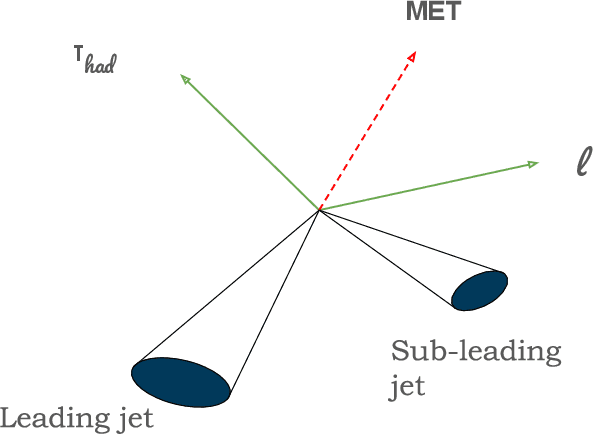
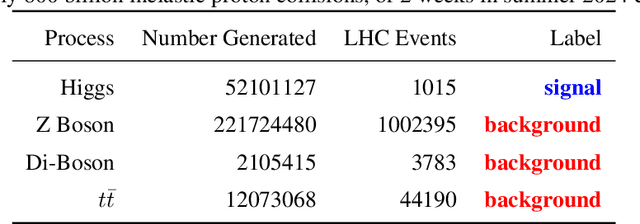
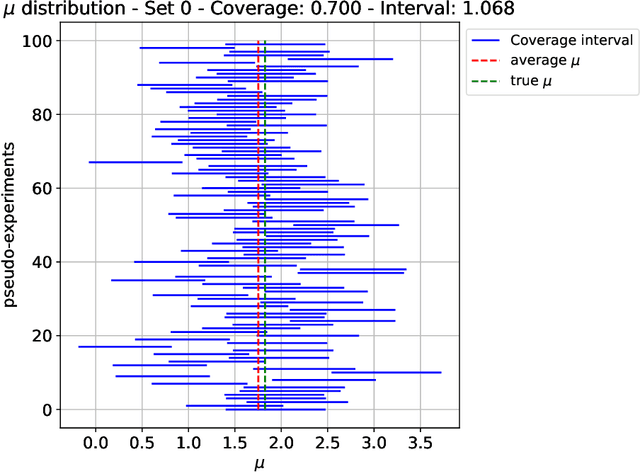
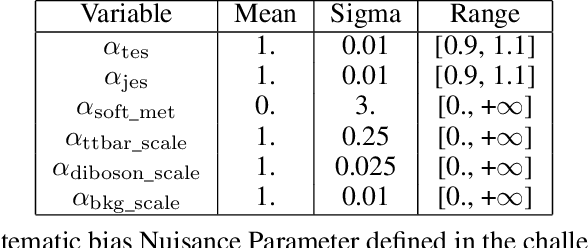
Abstract:The FAIR Universe -- HiggsML Uncertainty Challenge focuses on measuring the physics properties of elementary particles with imperfect simulators due to differences in modelling systematic errors. Additionally, the challenge is leveraging a large-compute-scale AI platform for sharing datasets, training models, and hosting machine learning competitions. Our challenge brings together the physics and machine learning communities to advance our understanding and methodologies in handling systematic (epistemic) uncertainties within AI techniques.
Multidimensional Deconvolution with Profiling
Sep 16, 2024
Abstract:In many experimental contexts, it is necessary to statistically remove the impact of instrumental effects in order to physically interpret measurements. This task has been extensively studied in particle physics, where the deconvolution task is called unfolding. A number of recent methods have shown how to perform high-dimensional, unbinned unfolding using machine learning. However, one of the assumptions in all of these methods is that the detector response is accurately modeled in the Monte Carlo simulation. In practice, the detector response depends on a number of nuisance parameters that can be constrained with data. We propose a new algorithm called Profile OmniFold (POF), which works in a similar iterative manner as the OmniFold (OF) algorithm while being able to simultaneously profile the nuisance parameters. We illustrate the method with a Gaussian example as a proof of concept highlighting its promising capabilities.
Moment Unfolding
Jul 15, 2024Abstract:Deconvolving ("unfolding'') detector distortions is a critical step in the comparison of cross section measurements with theoretical predictions in particle and nuclear physics. However, most existing approaches require histogram binning while many theoretical predictions are at the level of statistical moments. We develop a new approach to directly unfold distribution moments as a function of another observable without having to first discretize the data. Our Moment Unfolding technique uses machine learning and is inspired by Generative Adversarial Networks (GANs). We demonstrate the performance of this approach using jet substructure measurements in collider physics. With this illustrative example, we find that our Moment Unfolding protocol is more precise than bin-based approaches and is as or more precise than completely unbinned methods.
Constraining the Higgs Potential with Neural Simulation-based Inference for Di-Higgs Production
May 24, 2024

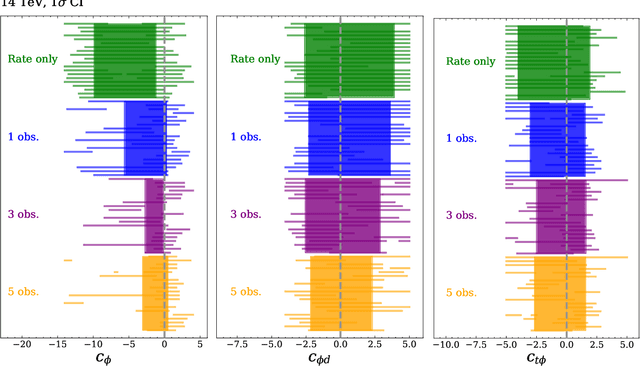
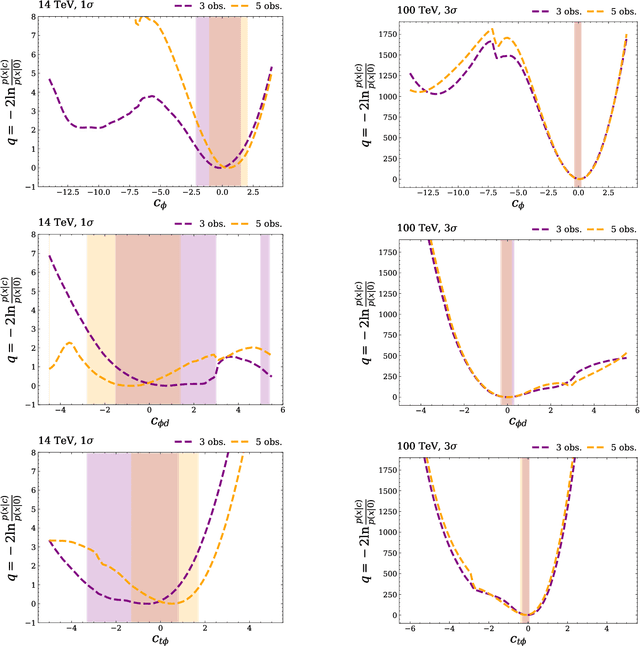
Abstract:Determining the form of the Higgs potential is one of the most exciting challenges of modern particle physics. Higgs pair production directly probes the Higgs self-coupling and should be observed in the near future at the High-Luminosity LHC. We explore how to improve the sensitivity to physics beyond the Standard Model through per-event kinematics for di-Higgs events. In particular, we employ machine learning through simulation-based inference to estimate per-event likelihood ratios and gauge potential sensitivity gains from including this kinematic information. In terms of the Standard Model Effective Field Theory, we find that adding a limited number of observables can help to remove degeneracies in Wilson coefficient likelihoods and significantly improve the experimental sensitivity.
The Landscape of Unfolding with Machine Learning
Apr 29, 2024



Abstract:Recent innovations from machine learning allow for data unfolding, without binning and including correlations across many dimensions. We describe a set of known, upgraded, and new methods for ML-based unfolding. The performance of these approaches are evaluated on the same two datasets. We find that all techniques are capable of accurately reproducing the particle-level spectra across complex observables. Given that these approaches are conceptually diverse, they offer an exciting toolkit for a new class of measurements that can probe the Standard Model with an unprecedented level of detail and may enable sensitivity to new phenomena.
Unifying Simulation and Inference with Normalizing Flows
Apr 29, 2024



Abstract:There have been many applications of deep neural networks to detector calibrations and a growing number of studies that propose deep generative models as automated fast detector simulators. We show that these two tasks can be unified by using maximum likelihood estimation (MLE) from conditional generative models for energy regression. Unlike direct regression techniques, the MLE approach is prior-independent and non-Gaussian resolutions can be determined from the shape of the likelihood near the maximum. Using an ATLAS-like calorimeter simulation, we demonstrate this concept in the context of calorimeter energy calibration.
 Add to Chrome
Add to Chrome Add to Firefox
Add to Firefox Add to Edge
Add to Edge